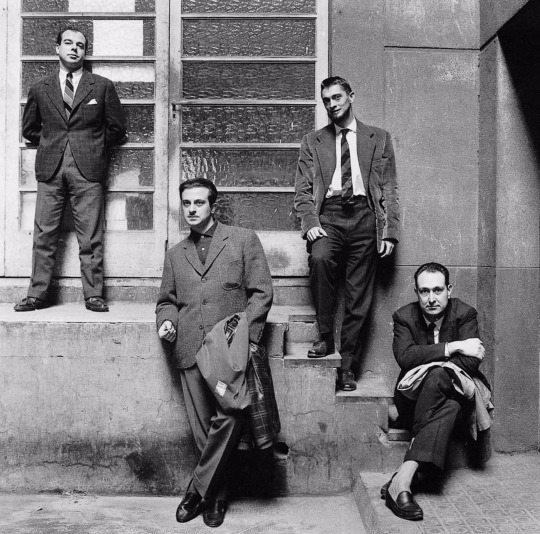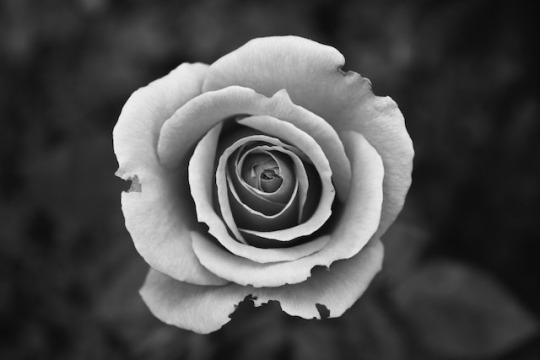#goytisolo
Explore tagged Tumblr posts
Text
youtube
"(...) la decisión sionista de fines del s. xix de colonizar palestina y de crear un hogar nacional judío no se aplicaba a un territorio vacante sino habitado por un pueblo de un millón de personas cuya existencia y voluntad fueron sistemáticamente ignoradas"
"los palestinos desconocían que su tierra era el objeto de un sueño, despierto o no, de los judíos oprimidos del este de europa, espacio de un sueño en el que todo estaba por hacer; los judíos de 1910 lo soñaban vacío o, en el peor de los casos, poblado de sombras sin consistencia, sin vida individual, ningún palestino sabía que su jardín era un espacio vacío, abolido en cuanto jardín, espacio soñado a cien kilómetros y destinado a convertirse en un laboratorio mientras que él mismo, el dueño del jardín, no era sino una sombra pasajera en este, una sombra que no existía sino en sueños, a cien kilómetros de allí"
2 notes
·
View notes
Text

Generación de los 50' : Gil de Biedma, Agustín Goytisolo, Carlos Barral y José María Castellet. El grupo de Barcelona posa en los viejos talleres de Seix Barral en 1961.
Oriol Maspons.
50 notes
·
View notes
Text
Tú no puedes volver atrás
porque la vida ya te empuja
como un aullido interminable.
Hija mía es mejor vivir
con la alegría de los hombres
que llorar ante el muro ciego.
Te sentirás acorralada
te sentirás perdida o sola
tal vez querrás no haber nacido.
Yo sé muy bien que te dirán
que la vida no tiene objeto
que es un asunto desgraciado.
Entonces siempre acuérdate
de lo que un día yo escribí
pensando en ti como ahora pienso.
La vida es bella, ya verás
como a pesar de los pesares
tendrás amigos, tendrás amor.
Un hombre solo, una mujer
así tomados, de uno en uno
son como polvo, no son nada.
Pero yo cuando te hablo a ti
cuando te escribo estas palabras
pienso también en otra gente.
Tu destino está en los demás
tu futuro es tu propia vida
tu dignidad es la de todos.
Otros esperan que resistas
que les ayude tu alegría
tu canción entre sus canciones.
Entonces siempre acuérdate
de lo que un día yo escribí
pensando en ti
como ahora pienso.
Nunca te entregues ni te apartes
junto al camino, nunca digas
no puedo más y aquí me quedo.
La vida es bella, tú verás
como a pesar de los pesares
tendrás amor, tendrás amigos.
Por lo demás no hay elección
y este mundo tal como es
será todo tu patrimonio.
Perdóname no sé decirte
nada más pero tú comprende
que yo aún estoy en el camino.
Y siempre siempre acuérdate
de lo que un día yo escribí
pensando en ti como ahora pienso.
José Agustín Goytisolo.
Palabras para Julia.
#José Agustín Goytisolo#escritos#poetic#poesia#poemas#poetry#poem#poets on tumblr#writers and poets#reflexión#frases#escritor#libros#cuentos#citas en español#filosofía#filósofo#libros filosofía#spanish#spanish quotes
4 notes
·
View notes
Text

GONZALO GOYTISOLO GIL
8 notes
·
View notes
Text

#lana del rey said “comfortably numb but with lithium came poetry” and josé agustín goytisolo wrote this poem about lithium#girl-#josé agustín goytisolo#*
2 notes
·
View notes
Video
youtube
KC & The Sunshine Band - Get Down Tonight
#youtube#kc and the sunshine band#i'm your boogie man#harry wayne casey#richard finch#jerome smith#fermin goytisolo#oliver brown#ken faulk#beverly champion#margaret reynolds#jeanette williams#whit sidener#mike lewis#vinnie tanno#disco#funk#blue eyed soul#70s#70s music#music is love#music is life#music is religion#raining music
18 notes
·
View notes
Text
PALABRAS PARA JULIA, Autor: José Agustín Goytisolo
Tú no puedes volver atrás porque la vida ya te empuja como un aullido interminable. Hija mía es mejor vivir con la alegría de los hombres que llorar ante el muro ciego. Te sentirás acorralada te sentirás perdida o sola tal vez querrás no haber nacido. Yo sé muy bien que te dirán que la vida no tiene objeto que es un asunto desgraciado. Entonces siempre acuérdate de lo que un día yo…
0 notes
Text
Juan Goytisolo - Alla ricerca di Gaudí
Se tutte le biografie sono delle finzioni, perché quella di Gaudí dovrebbe essere veritiera? Il viaggiatore barcellonese che, sul tragitto da Nevsehir a Ürgüp, svolti a sinistra verso la valle di Avcilar, in direzione delle celebri chiese rupestri di Göreme e di Zelve, penetra in un paesaggio in cui il prodigioso e l’insolito non riescono a cancellare completamente un’impressione diffusa e…
#Antoni Gaudí#Barcellona#Biancamaria Bruno#Cappadocia#Giovanni Ludovico Vives#Juan Goytisolo#Mossen Jacinto Verdaguer#Pau Audouard
0 notes
Text
SERRAT: PEQUEÑAS GRANDES COSAS
EUFEMÉRIDES El noi de Poble Sec cumple 80 años Francisco R. Pastoriza En aquella España de principios de los sesenta el panorama nacional de la música estaba monopolizado por las líneas que marcaban el pop de Los Brincos y Los Pekenikes, los alegres temas de Karina y las tonadillas de Raphael, que a su vez habían sustituido a las de Concha Piquer, a las baladas de José Guardiola, a…

View On WordPress
#Ana Belén#Antonio Machado#Brincos#Camilo Sesto#Concha Piquer#Duo Dinámico.#Els Setze Jutges#Engelbert Humperdnck#Gllermna Motta#Guillemina Motta#Joan Salvat-Papasseit#José Agustín Goytisolo#José Guardiola#Josep María Espinás#Kaina#Lluis Llach#Los Cinco Latinos#Mario Benedetti. Miguel Ríos#Miguel Hernández#Nino Bravo#Pekenikes#Raphael#Serrat#Tom Jones#Víctor Manuel
1 note
·
View note
Text
"Poesía desde el abismo: Doce ejemplos finales"

En la historia literaria, emergen escritores cuyas plumas forjaron obras profundas y conmovedoras. A medida que exploramos sus vidas, nos adentramos en un mundo marcado por la tristeza y la tragedia. Figuras como Miyó Vestrini, Marina Tsvetáeva, Hanni Ossott, Martha Kromblith, Andrés Caicedo, Cesare Pavese, José Agustín Goytisolo, Gabriel Ferrater, Amelia Rossell, Antonieta Rivas Mercado, Pedro Casariego y Ana Cristina Cesar, encontraron en la escritura un refugio. Un lugar donde las palabras retumban con una intensidad sombría, una reflexión desgarradora de sus luchas personales que culminaron en finales insondablemente trágicos. Leer post completo»
#Poetas suicidas#literatura#cultura#herederos del kaos#narrativa#poesía#poesías#relatos#Miyó Vestrini#Martha Kromblith#Andrés Caicedo#poetas malditos#Hanni Ossott#Marina Tsvetáeva#Gabriel Ferrater#Cesare Pavese#José Agustín Goytisolo#Ana Cristina Cesar#Antonieta Rivas Mercado
1 note
·
View note
Text
Fue una triste casualidad que José Agustín Goytisolo, el poeta que escribió uno de los más bellos textos sobre la paternidad, falleciera el día del padre de 1999, hace hoy 25 años. Ese poema fue "Palabras para Julia", su hija.

Literland
7 notes
·
View notes
Text

In 1990 the Spanish writer Juan Goytisolo published a short essay called Paris, Capital of the 21st Century. By the end of the 20th century, he had decided that Paris was exhausted. The city of avant gardes, ideas, revolutions and class struggle, which had defined so much of European and world history, was now no more than a museum. As almost a lifelong Parisian and a lover of the place, Goytisolo desperately wanted Paris in the 21st century to retake its place as a great metropolis. But this could only happen, he argued, if Paris reinvented itself by “de-Europeanising” itself. By this, he meant it had to look towards the world beyond Europe, welcoming its sometimes dissident non-French, non-European voices to make itself a truly global city. Only in this way could Paris be brought back to life.
More than 30 years on from that essay, Simon Kuper has written a book about what it has actually been like to live in Paris during the past two decades. I have lived in the city for exactly the same period, in the working-class district of Pernety, and seen all the changes that Kuper has. The view from Pernety and the view from his hipster right bank world have not always been the same. He often underestimates, for example, the severity of racial and class tensions in Paris. To his credit, however, he is always aware of his limitations as a foreigner and as an apprentice Parisian.
The author, a journalist for the Financial Times, begins by describing his arrival in the city in the early 00s, a refugee from extortionate property prices in London. He finds in Paris an alternative economic universe, where decent city centre apartments were affordable along with a good quality of life that wasn’t dependent on a big salary.
Initially, Kuper bought into the shibboleth that Paris was a dead place – economically moribund, artistically bankrupt, something very much like Goytisolo’s museum. Over the years and decades, however, as he settled in, established a family and a way of life, Kuper began to change his mind as he navigated the unpredictable joys and vicissitudes of Parisian daily life. This involved wrangling with tough neighbours, taking kids to football matches in the banlieues (the outer suburbs, which are definitely not museum-ified), learning schoolyard slang from his kids (which contains a surprising amount of street Arabic), dealing with his wife’s cancer diagnosis, negotiating the daunting French social security system and, perhaps hardest of all, learning how to act as a proper Parisian – a performance that demands mastery of an almost infinite number of behavioural codes.
Kuper is a self-confessed “Bobo”, a member of the middle-class elites and as such most of the behaviours he has to acquire revolve around the right way to wear clothes or making the right sort of conversation. Above all, you should never appear to be provincial (an old Gaulish word, plouc, is still used by Parisians to describe out-of-towners) or from the banlieues (wearing sports clothes is a giveaway). As he learns to be a local, however, Kuper can seem a little too pleased with himself and there are moments when, as he yet again cycles down a lovely cobbled street to another designer coffee shop, you wish he’d get a puncture.
Nonetheless, Kuper is a clear-eyed observer of the history that is happening all around him. He witnesses the revolt of the gilets jaunes, which he notes are in part a protest “against Paris itself” (against people such as Kuper, in fact), sees the burning of Notre Dame, sweats through historically unprecedented heatwaves and copes with the pandemic. The most momentous – and terrifying – event that marked Kuper’s Parisian life was the night of 13 November 2015, which no Parisian who lived through it will ever forget. He was in the Stade de France when the first bombs went off, the prelude to a night of massacre that finished with 130 innocent people dead. Ever the professional reporter, Kuper keeps his feelings to himself, until a few days later he cries in front of a friend, broken by the strain of living in a city that seemed about to go mad.
Now the Olympic Games are on the horizon and Paris looks set to announce itself again to the world as a global leader, as the multicultural city imagined by Juan Goytisolo. For all of the transformations of the past two decades, however, Kuper is always alert to the city’s particularity. This is the immutable essence – to be found in the daily pleasure of the menu du jour or just the snarky, nasal banter at your local zinc (bar) – that makes Parisians love their city, and foreigners such as Kuper (and me) love it even more.
Daily inspiration. Discover more photos at Just for Books…?
7 notes
·
View notes
Photo

“Black Cat,” a 1945 photograph by Brassaï (1899-1984).
A poem by Juan Goytisolo (born 6 January 1931; died 4 June 2017):
A cat eyes me
like an English duchess.
What does it expect from me?
Why stare so hard?
Does it silently reproach
an evil act I conceal?
Is it an invitation
to accept a sentence?
The cat is no cat.
It is my soul and my conscience.
(translated from the Spanish by Peter Bush)
100 notes
·
View notes
Photo

GONZALO GOYTISOLO GIL
10 notes
·
View notes
Text
COLM TÓIBÍN Restlessness: A Syllabus
I am interested in texts that are pure voice or deal with difficult experience using a tone that does not offer relief or stop for comfort. Sometimes, the power in the text comes from powerlessness, whether personal or political. Sometimes, death is close or danger beckons or violence is threatened or enacted. Sometimes, there is a sense of real personal risk in the text’s revelations. Sometimes, there is little left to lose. All the time, the tone is incantatory or staccato or filled with melancholy recognitions.
Euripides, Medea
Sophocles, Electra
Sophocles, Antigone
Sylvia Plath, Ariel
Louise Glück, The Wild Iris
Anne Carson, Autobiography of Red
Juan Goytisolo, Forbidden Territory
Joan Didion, A Book of Common Prayer
Oscar Wilde, De Profundis
Nadine Gordimer, The Late Bourgeois World
Ingmar Bergman, Autumn Sonata
John McGahern, The Barracks
Béla Tarr and Ágnes Hranitzky, The Turin Horse
Doris Lessing, The Grass Is Singing
J. M. Coetzee, Age of Iron
Béla Bartók, Bluebeard’s Castle
Constance Debré, Love Me Tender
9 notes
·
View notes
